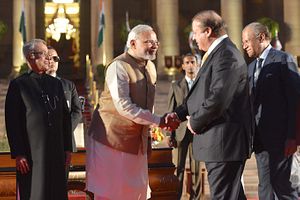On March 23, 1940 that the Muslim League, then a nascent political party, passed a resolution to establish the state of Pakistan. Each year, on that same day, the diplomatic enclave in the heart of New Delhi ushers in Pakistan Day by turning into a veritable fortress, replete with police picket lines and bodyguards manning entry and exit points. Scores of media vans clog the avenues, and hundreds park their cars in the streets. It’s anything but a normal day.
This year, the media proved even more curious than usual, hoping to figure out whether India would send a representative to participate in the celebration of Pakistan’s founding.
That curiosity has a long history. Last August, India abruptly canceled secretary-level talks with Pakistan, angered over interactions between Pakistan’s envoy to India, Abdul Basit, and separatist leaders in Kashmir.
Now, with New Delhi showing an increased willingness to engage Islamabad, Basit again sent an invitation to the separatist leaders to be the chief guest on Pakistan Day. Would India be willing to share the venue with Kashmiri separatists?
At the last moment, Prime Minister Narendra Modi sent General VK Singh to represent the government at the event. The move came less than seven months after Modi proclaimed there would be no engagement with Pakistan until it stopped consorting with separatist Kashmiris.
The pivot away from that position began last month, when Foreign Secretary S. Jaishankar visited each of India’s neighbors in South Asia, a trip billed as a crash course in regional politics. But some analysts believe Jaishankar’s tour was basically meant to reestablish contact with Pakistan.
Singh’s presence at the Pakistan Day festivities is a further proof that New Delhi is increasingly flexible in dealing with Pakistan. The junior minister spent just 15 minutes at the event. His brief presence, however, might go a long way in normalizing India’s relationship with Islamabad. In his opening remarks at the event, Basit talked of establishing “a legacy of peace” between the two nations. He assured India that Pakistan would be an equal partner in normalizing the relationship between the two neighbors.
But just after Singh left the event, controversy erupted. The general tweeted to expresses his “disgust” at being part of the celebration.
Today’s controversy demonstrates the difficulties that the Bharatiya Janata Party (BJP) government faces in dealing with Pakistan. The Hindu nationalists will have to convince hardcore supporters of the need for a dialogue with Pakistan. Narendra Modi himself once deemed engagement with Pakistan as an “anti-national” activity.
The pressure of hardcore BJP supporters forced the government to cancel secretary-level talks so abruptly. Now, the differences between domestic political compulsions and geopolitical reality have started dawning on Modi.
The BJP’s coalition with the People’s Democratic Party (PDP) in Kashmir compels Modi to tone down anti-Pakistan rhetoric. The PDP supports autonomy for Kashmir and hopes for the normalization of relations with Islamabad to restore lasting peace in the valley.
The BJP has taken a huge gamble by aligning with a nationalist party in Kashmir, but there’s a method to their madness. Modi’s party hopes to resume talks with Pakistan to insulate Kashmir from cross-border attacks. An escalation of tension at the India-Pakistan border would damage support for the BJP among core supporters, who expect the party to deal with the violence. If violence crops up in the valley, the BJP’s standing will take a hit. For Modi, there is no option but to engage Pakistan.
Afghanistan is also a point of contention. With President Ashraf Ghani engaging Islamabad, India fears it is taking a back seat in the Hindu Kush. Ghani has also cancelled a request for heavy arms from India, sending a strong message to Delhi that Pakistan is a more important ally.
Though New Delhi maintains that there is no place for a third party in talks with Islamabad, that’s nothing more than rhetoric. Such a step would be welcome: it may have prevented the controversy that enveloped the relationship after Singh’s tweet. Delhi and Islamabad can’t afford those kinds of distractions if the relationship is to get back on track.
































